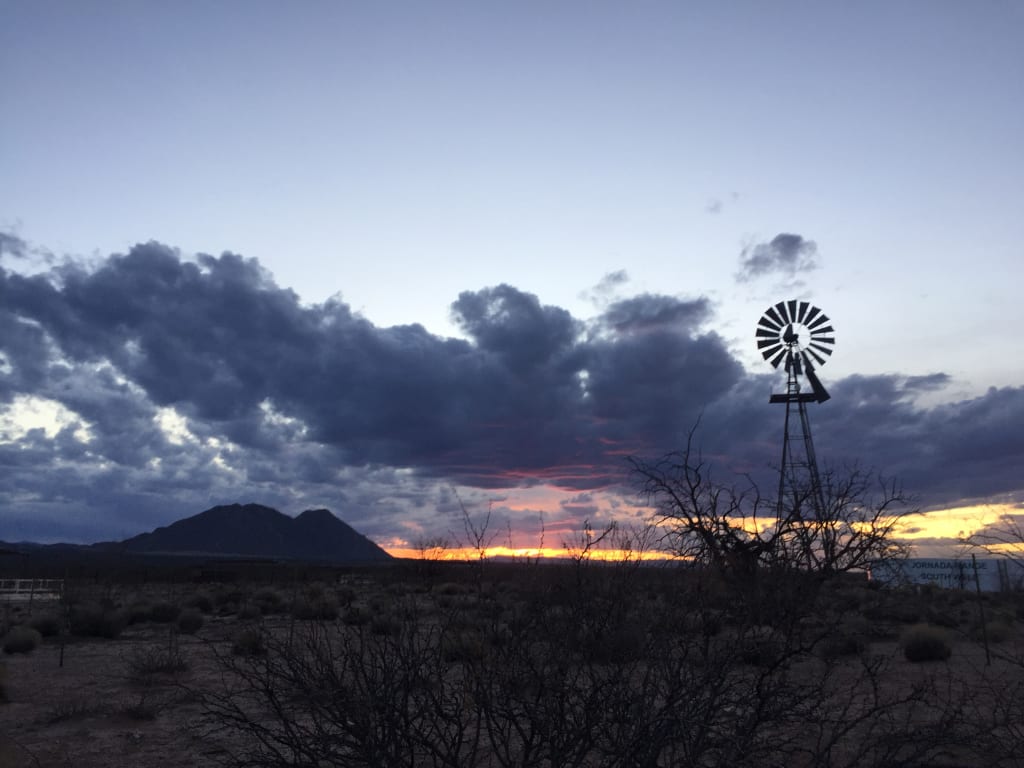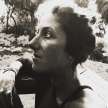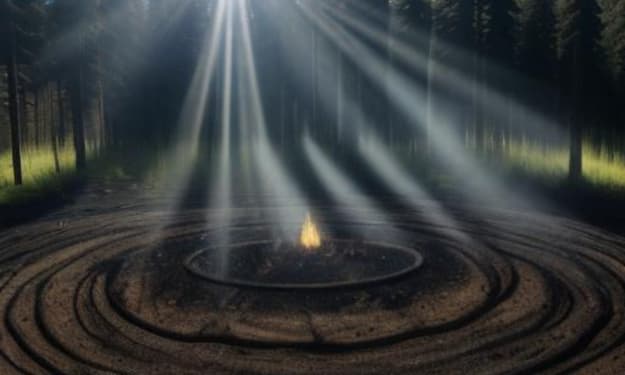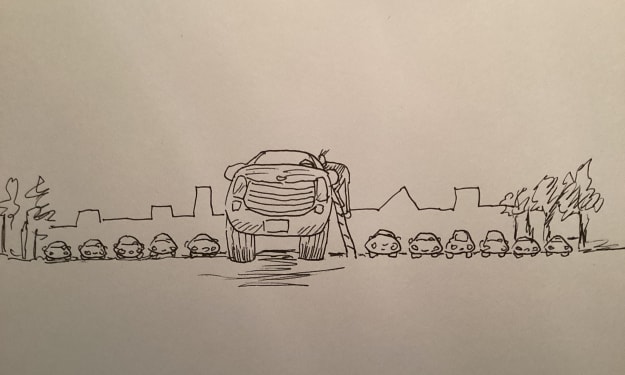The Jornada
milk and honey on the other side

Sara looked at the muddy road in front of her and knew she should have stopped at the second gate, where the road turned from gravel to dirt. She had only been at the station for a few days, and she didn’t even know how to reach the range manager. Less than five minutes and barely a mile later, she came up on a long stretch of water where the road was supposed to be. She wasn’t surprised when the wheels started spinning, and she slowly rolled to a stop. She was looking down at her phone and trying to push aside her pride when she saw the lights bouncing towards her in the rearview mirror, and the 4x4 pulled up beside her.
It was the range manager, Alejandro, who just happened to be on his way home, and she grabbed the groceries she’d picked up in town - making sure she got the beer - and climbed up into the cab of the dusty, warm truck. Sara didn’t try to make excuses, and he didn’t give her a hard time about getting stuck.
When they pulled up to the trailer, she thanked him for the ride, and she thought he was smiling back at her but his face was too wrinkled to really tell. He said it would probably be a few days until it was dry enough to get the truck out. He could swing by in the morning if she wanted a ride, to the old dirt well in the northern pasture where they would meet the others. She thanked him and ducked into the trailer, kicking her boots off, opening a beer, and turning on the small ceramic heater to hold her hands in front of.
She’d come out to the Jornada, an experimental cattle range tucked between and creeping up into the Gila Mountains in New Mexico, to study the ranchers and how they came to know what they knew about the landscape. They managed herds of small, scruffy cattle that roamed around what passed for pastures, though they seemed to have more sand than anything else. She’d grown up on a farm, and felt comfortable around the animals, but she’d eventually realized that people were much more interesting to study than cattle.
But these weren’t the huge, sleek animals, who lumbered through the humidity and thick grass of back home, back east. They were skittish, half-wild creatures; scrappy and worn down by the sun, the sand, and the summer heat of the high desert. They were the descendants of Criollo cattle that the Spanish had brought up from Mexico centuries ago. They had driven them up on trails you could still find in the desert today, if you knew how to look for them, like the old rutted wagon wheel trails in the Midwest.
The cattle might be different, but the ranchers seemed the same. She spent the first few weeks getting to know them and the range, helping with the cattle counts and pasture changes. Her horse was lean, faster rather than bigger, and in the evenings she walked over to the barn, ostensibly to feed and water the horse, but really she just liked the company while the sun set over the mountains. The trailer was a dump, but the heaters in every room kept it warm enough. It was 13 miles down a straight, dead end road. The sun came up, bright and warm over the Organ Mountains, and set over the Doña Anas, and you might not see anything or anyone else except cattle all day. It was perfect.
One Saturday, about a month in, everyone came out to the Jornada to help move the cattle and weigh a few of the new, smaller herds, to see how they had done on the winter forage. Sara had only been that close to sweet, docile milk cows, who wanted to be petted. These animals were skittish, and unpredictable in the small pens. They were forced into a chute, one by one, and locked in while they were weighed and radio collared, and they fought everyone every step of the way.
They’d gone through half of the first herd when a pregnant cow entered the chute. Alejandro threw up the walls of the chute, and they pressed tight against her midsection. He fastened the collar on her, and it seemed that he knew what the cattle would do before they did - he dodged her head as she tried to catch him with her horns. After he was done, though, instead of releasing her, he moved towards her rear and called out something in Spanish, towards the barn. A few moments later, a few other hands came out with supplies, and before she could comprehend what was happening they were pulling on two small feet that had appeared underneath her tail. And then, the calf was out.
Sara felt like clapping, or cheering, but she stopped herself. Of course, this wasn’t an unusual or special occurrence. The mother was released and followed the calf, as it was dragged unceremoniously into the middle of a small pen to the side. A few minutes later it trembled up onto its legs. By then, the next cow had already entered the chute and the walls had clanged shut again. She said she needed to go grab her water bottle from her truck - really, she wanted to get her phone and take a few pictures of the calf - and she and a student started making their way up and down and through fences, towards the parking area. They made it to the next to last fence as the assistant manager, Luis, was unhooking his trailer in the large pasture by the maze of pens. The bull lived there, in that big pasture next to the barn, and he was slowly making his way towards the three of them.
Luis assured them they could make it across the field and over the last fence before the bull reached them - unlike the other cattle, he was huge, and slow, or so it seemed. They started walking towards the road, chatting about the birth, when the bull changed his course towards them. It seemed like he was moving faster now, too, so they picked up their pace. Then he started moving faster still. They looked behind them, towards Luis and the truck, then back towards the fence, then towards one another. They were closer to the fence by then, so they started running.
They had just made it up and over the fence when the bull got close enough to start slowing down, and then he paced back and forth next to the road as they walked, winded, laughing a bit more out of nervous energy than because anything was really funny. They got a few extra water bottles and headed back towards the barn, taking the longer way through the maze of chutes.
When the last of the cattle were collared and released, they headed to the house. The range was actually split in two - Alejandro managed the Jornada, which was owned by the USDA, and Philip managed the other half, which was owned by the university in town. Philip had been moving cattle the first half of the day, but now he was back at the ranch house manning the grill.
He was the kind of rancher she thought she knew - a tall, blonde, corn fed roughneck. He would have been a redneck, back home, but that word just couldn’t quite come out of her mouth here. There was something about the desert that made the ranchers here harder than the guys she had grown up with. There was too much, back home - too much water, too much grass. There was such abundance and excess, and it often ended up as weight packed on around the midsection of the men. Too many bugs, too, they would have said. Too much rain, and too much clover for the cattle. Here, though, everyone and everything survived based on how they made do with the precious little they had. And so the ranchers, like the cattle, seemed to be a different species, she was learning.
They spent the evening drinking beer and eating off the grill. Luis finally told them the truth about the big bull - that he was more likely to lick them to death than trample them. Apparently, they had all been watching and laughing as the two of them had run across the pasture away from the bull who probably only wanted a scratch on his back. It was a funny story now, having just the right amount of imagined danger, now passed, to let them pretend to be outraged.
Finally Philip turned the hood up on the grill, and turned to face the small circle of folks who still remained. The sun was just starting to set, dancing behind the mountains, when someone brought up the election. She stiffened, involuntarily, but it was just a passing comment, and the conversation quickly turned towards the spring winds.
But then, Philip began to tell a story.
A story of how he had found a man in the ranch house one bright, hot afternoon. The man didn’t speak a lot of English, but he got it across that he was lost, and he’d come inside the house looking for water. He’d crossed the border with a coyote a few days before, and had been following maybe one of those old cattle trails north, but it had led him into the desert and onto the range.
Philip had called the Border Patrol, like he was supposed to. Like he had done in the past, but while they waited he’d made the man a sandwich and gave him cup after cup of water. He’d listened to the man describe his journey. Why he had left Mexico, and how he had come to be passing through Las Cruces. He was trying to move at night, but he kept getting lost, and the night before he had wandered out of sight of the highway and out onto the range.
Then, Philip stopped, and brought his hand to his mouth. The man had spoken of his kids and the barren land that he’d left behind, after years of trying to stay while fields turned to dust. He was trying to make it to Illinois, where he had family and a job in a factory, if he could just get there. Philip said then that he wished he hadn’t called Border Patrol, and no one moved or even breathed. He brought a hand up to his eyes, as if to squeeze out the tears that wanted to come.
He said, “I can’t imagine how goddamn hard it must have been for him to leave his kids and walk through this desert, night after night. I wish to God I’d just taken him back out to the highway, got him on his way.”
He stopped, and stared out at the mountains for a few moments.
“Someone would have picked him up,” he continued. “A trucker could have gotten him to Illinois. I mean, what are we doing in this country, putting people in prison, just because they’re trying to feed their kids?”
And then, this great, big, ruddy roughneck wiped at the tears coming slowly down his cheeks, and shook his head. “I don’t know what we’re doing. I really don’t, sometimes. They just hauled him off.”
They all stood in the yard then, watching the blood orange sun set over the mountains, no more words coming to anyone. On her way back to the trailer, later, she stopped on the road in the darkening sky and tried to imagine the courage it would take to try and make it across the range in the middle of the night. To have such a hope, and need, and dream, to just make it to Illinois. When she got home, she turned on the heaters and unlocked the door. Just in case.
About the Creator
Ruthie
Singer in storms.
Enjoyed the story? Support the Creator.
Subscribe for free to receive all their stories in your feed. You could also pledge your support or give them a one-off tip, letting them know you appreciate their work.







Comments
There are no comments for this story
Be the first to respond and start the conversation.